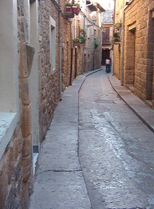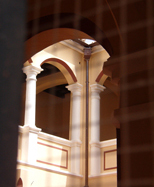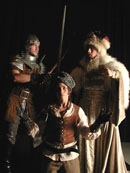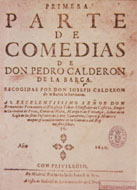|
 |
 |
| |
My interests lay on complexity in cultural systems. I approach this problem from several places (Humanism, Golden Age Drama, the Literary Act, the Baroque), and in most cases I use the Early Modern period of transatlantic relations in the Spanish world as the lab to trace the emergence of complexity in our world. I also work (although with less intensity) on present forms of cultural adaptation to complexity through the literary act.
Methodologically, my work follows the principles of team-work, intensive research (both in the elaboration and creation of knowledge), use of information technology, and a clear concern to make of our research a tool to better our lives today. If the lab is, mainly, in the past, the aim is clearly on the present. |
|
|
|
|
|
| |
Technologies of Humanism — 2004-2006
Departing from the distinction between the historical project of the Spanish humanism and the technologies associated with the intellectual method called “humanism”, this project shows how the interaction between the classic principle of imitation and the novelty arising from the encounter with America derived in the development of the three technologies (chronography, knowledge management, and pragmatics of imaginative writing) that made possible the survival of humanism and are evidence of its relevance today. To be published as a book by the Universidad de Huelva in 2006. |
|
|
 |
|
 |
| |
Calderón: The Invention of Modern Time — 2004-2007
This project deals with the new forms of representing time in 17th-century Spanish Drama. It shows how time works in three areas of the theatrical world: the new aesthetic theories c.1600; the technology of the theater building and the social aspects of the phenomenon; the representation of time within the plays. Funded by a SSHRC′s Standard Research Grant. |
Top |
|
|
| |
Reading and Complexity: Life is a Dream — 2004-2006
This project consists of an analysis of Calderón′s play by using the concept of “ontogenesis of information” and showing the interactions among the several layers of textuality associated with the play (two versions, hyper-textual links, disorder of the plot, and representations of time). The objective is two fold: to show that the focus of this play is on reading and that the author develops a method to read reality in an unstable world. The conclusions are that reading gives a support to establish subjectivity, and that the very act of reading is conceived as a method of adaptation to the complexity of the baroque world.
|
|
|
|
 |
| |
The Transatlantic Baroque — 2006-2013
Based upon the conclusions of the research carried out during the last three years, and disseminated in several ways (including the three International Conferences held at Western, and Casa de América in Madrid), this multidisciplinary and international project brings together researchers from Latin America, Europe, USA, and Canada to explore the emergence, development, and breaking of the Transatlantic Baroque. This is considered as cultural system whose complexity can be mapped through the interactions of its three attractors: information, representation, and domination (Suárez, South Atlantic Review, 2005, in press). This model of complexity in cultural systems will be developed through the study of three main lines of research: 1) Technologies of Culture; 2) Conflicting Identities and Representations; 3) The Effectiveness of the Neo-Baroque. I coordinate the research team, and also contribute with a specific project on “Knowledge Management in the Hispanic Baroque” funded by a Premier′s Research Excellence Award. |
Top |
|
|
| |
Calderón: Complete Comedies — 2004-2009
The joint project by the Universidad de Navarra and Western to publish a critical edition of the over 100 Calderón′s comedies contemplates a first phase in which 60 comedies will be edited. Responsibility for researchers at Western include editing 15 comedies, coordinating North American researchers, providing training in textual criticism and archival research, and managing the electronic resources of the project. There are over 30 researchers from Latin America, North America, and Europe associated with the project. At Western part of the project has been funded by an Internal SSHRC Grant. |
|
|
 |
|
 |
| |
Globalization and New Literatures —2005-2010
In this project we are trying to map the points of contact between globalization and the production of recent literature in Latin America and Spain (after 1989). We are interested in the way in which new literary texts reflect economic processes, new technologies, and new identities. Another important element of this research is the study of the adaptation of the technologies of fiction and creation to the ecosystem emerging from the new technologies of culture and the question of the relevance of literature in this context. Is literary creation affecting globalization and technology?
Our interests extend, but are not limited, to the creation by authors of the McOndo and Crack movements, authors embodying the Neo-Baroque movement, authors working at both sides of the Mexico-U.S.A. border, and individual authors such as Horacio Castellanos Moya ( El Salvador), and Javier Marías (España). |
Top |
|
|

|
-- Knowledge Management in the Hispanic Baroque ($150,000 -- Premier′s Research Excellence Award --2005-2010)
-- Calderón: Recollection of Manuscripts ($5,000 -- Internal SSHRC -- 2005-2006)
-- Representations of Time in Spanish Baroque Drama: Calderón ( $51,962— Social Sciences and Humanities Research Council′s Standard Research Grant — 2004-2007)
-- Smallman Fund — $3,000— Faculty of Arts and Humanities, UWO — 2004
-- Representations of Time in Spanish Baroque Drama ( $5,500— SSHRC′s Reapplication Grant, UWO — 2003-2004)
-- Polanyi Prize for Literature ($15,000— Government of Ontario — 2002-2003 )
-- A Symbolic Reading of Life is a Dream ( $6,600— Internal SSHRC, UWO — 2002-2003 )
-- Representations of Time in Calderón′s First Part ( $4,400— Internal SSHRC, UWO — 2001-2002)
|
|
|
|
|
These are samples of theses that I have supervised or am supervising as of late:
In Progress:
Ms. Cecilia Brain: Conflicting Technologies of Communication in Colonial México, Ph.D. Thesis, 2008. http://publish.uwo.ca/~cbrain
Ms. Lauren Beck: Cartography, Cosmology, and Symbology. Maps as Texts in the Europe of the Humanists, Ph.D. Thesis, 2008.
Ms. Erin Cowling: Knowledge Management in the Hispanic Baroque. M.A. Thesis, 2006.
http://publish.uwo.ca/~ecowling
Mr. Oswaldo Ortegón: Latin American New Literature and Globalization: The Colombian Case. M.A. Thesis, 2006.
Completed:
Ms. Monica Nvylt: Globalization and the New Latin American Literature: McOndo, Crack, Eltit. M.A. Thesis, 2005.
Ms. Katherine Austin: The Neo-Baroque in Contemporary Latin American Culture. M.A. Thesis, 2005.
Ms. Montserrat Bores: Representations of Death in Spain and New Spain during the Baroque. M.A. Thesis, 2003.
Mr. Francisco López-Martín: Representations of Food in the Golden Age. M.A., Thesis 2003.
Mr. Brent de Vos: Reconstrucción de la puesta en escena clásica de una secuencia de El burlador de Sevilla, de Tirso de Molina. M.A. Thesis, 2000. |
Top |
|
|
 |
|
|